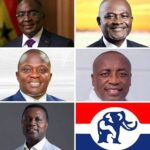Accra, October 6, 2025 — The New Patriotic Party, in a strongly worded statement, has refused an invitation from the Public Utilities Regulatory Commission to attend a public hearing on proposed utility tariff changes. The party says holding talks on higher utility bills now would punish ordinary Ghanaians who are already struggling with the high cost of living.
The letter, dated October 6 and signed by NPP General Secretary Justin Kodua Erimpong, says the invitation from PURC was first sent on September 9. PURC asked the party to attend a “public hearing on submitted utility tariff proposal for the 2025–2029 multi-year tariff review,” and to comment on proposals from state utilities, including VRA, GRIDCo, ECG, NEDCo, GWL, GNPC (listed as GNGC in the release) and EPC.
The NPP said it will not attend because there is no clear justification for any tariff hike at a time when Ghanaians already pay more to survive. The party singled out the so called “Dumsor Levy,” a charge introduced by government, and said that levy alone brings in over 575 million cedis every month, which they put at more than 5.7 billion cedis a year. The party asked that part of that money be used to support the regulated utilities instead of burdening consumers with extra costs.
Mr. Erimpong also rejected claims by some government spokespeople that the planned tariff changes are linked to conditions set by the International Monetary Fund. The party called such claims palpably false, and it noted that the current IMF programme is due to end next year, while the proposed tariff increments are slated to take effect from 2026 and run through 2029.
The release accuses the current government of putting the cost of mismanagement onto the shoulders of citizens. “Ghanaians are being unduly levied to pay for government’s incompetence in the management of these regulated utilities companies,” the statement reads, and promises that the party will “use all legitimate means” to fight any attempt to impose the increases.
The refusal is likely to raise the political temperature. The NPP is the main opposition party, and its decision not to participate makes the tariff review a contested public issue, not just a technical regulatory process. By calling out the levy and linking the proposed hikes to poor management, the party is framing the debate as one of political accountability, not only economics.
There are, however, counter arguments that the government and regulators are likely to make. PURC and the utilities argue that cost-reflective tariffs are needed to finance investment, reduce outages, and improve service quality. They say utilities must recover the real cost of fuel, transmission, and distribution if they are to invest in maintenance and expansion. Regulators also claim that public hearings are the right platform for stakeholders to air views, and that hearings protect consumers by forcing utilities to justify any rise.
Experts note this is a classic policy trade-off, and they warn against letting politics shut down technical debate. If tariffs stay too low, utilities may not have the funds to run properly, and outages could worsen. If tariffs rise without clear social protections, poor households will suffer more. That tension is exactly why public hearings exist, and why the regulator will face pressure to show evidence and to explain how any extra revenue will be used.
What happens next is uncertain. The NPP has made its stance public, and that will shape how consumers and lawmakers view the process. PURC can choose to proceed with the hearing without the party, or it can seek fresh consultations. Either way, ordinary Ghanaians will watch closely, because the outcome will affect monthly household budgets and the political arguments ahead of major national decisions.




